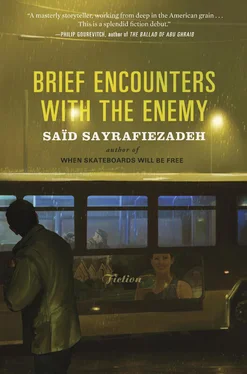In the first couple of months, I made a point of emailing her. We were each allotted fifteen minutes a day at the Internet café, and I sent her updates when I could.
“What’s going on down there, Luke?” she wanted to know. “Tell me everything.” She ended her emails with “xoxo* * *.”
“What’s that mean?” I had to ask one of the guys.
“Hugs and kisses,” he said.
“But what do the asterisks mean?”
He didn’t know.
There wasn’t much to report about what was going on. The enemy had yet to make his appearance. So I told her that we had an Internet café, and a bowling alley, and a Burger King. “They have everything down here,” I wrote.
It wasn’t entirely true. They didn’t have things like boots. It was the rainy season and it rained every day. To be fair, there were ponchos, but ponchos don’t keep you from slipping and sliding when you’re going along the path on patrol in Skechers. If you got caught in a particularly bad downpour, you might as well be ice-skating, and you’d come back to base at least an hour late. The sergeant would mark this down in his blue book. He’d make sure you saw him marking it down. What happened after that was anyone’s guess. “You get ten of those, you get court-martialed,” the most paranoid among us speculated.
Boots did finally arrive. This was about three months into our tour. They came from Timberland, no less, donated free of charge so that not everything would have to fall on the taxpayers. Half the guys sold their boots right off; they sold them to the other half of the guys who could afford to buy them and have two pairs. Then they used the proceeds to purchase things like cigarettes and instant soup. There was a guy named Chaz who wanted to give me twenty-five dollars for my boots. He acted like he was doing me a favor. “I’ll tell you what I’ll do,” he said. He sat down on my cot and took out his money. “Whaddya say?” He was trying to be chummy about it. He was trying to be down-home. He’d gone to a good college and his parents sent him money every two weeks and we had nothing in common except that we both wanted boots. He was one of those guys who had joined for all the wrong reasons. He had joined not because he believed in anything but because he wanted to put it down on his résumé and jump-start his career.
I told him, “You’re here for the wrong reasons, Chaz.”
He said, “What reasons are those?” As if he didn’t know.
He used phrases like “in the long term” regarding my boots. Twenty years from now, I’d probably see him on television, asking for my vote.
I emailed Becky to tell her that we’d gotten new boots from Timberland.
She emailed back:
But what else is going on? xoxo***
It wasn’t the rainy season now. It was the hot and dry season. No one needed boots anymore. I made it to the end of the path in fifteen minutes. I could have done it in flip-flops. I could have done it barefoot.
It was getting close to evening, and things were cooling down a bit, but the flies were buzzing and I was sweating badly because I was dressed as if I were heading into battle. I felt less like a soldier and more like I was going trick-or-treating dressed as a soldier; all I needed was a bag for my candy. Everything about me was superfluous and ridiculous — the boots but also the helmet, the jacket, and the backpack, which rattled on my back like a gumball machine. The gun was unnecessary too, but it was the lightest thing on me. That was the contradiction. It was three feet long and looked like it was made of iron, but it felt like plastic. It could have been a squirt gun, except for the fact that it had all sorts of gadgets and meters on it that told you things like the time and the temperature. Plus it could kill a man from a mile away. You hardly even had to pull the trigger. If you put your finger in the proximity of the trigger, it sensed what you wanted to do and it pulled itself. Poof went the bullet, and the gun would vibrate gently, as if you were getting a call on your cell phone.
The first time I’d ever shot a gun was when my dad had taken me and my sister down to the woods to go hunting. This was about ten years ago, when the war had just started. There were supposed to be things like deer and elk lurking around in those woods. At least that was how it had been when my dad was a kid and his dad had taken him hunting. But times had changed, and the factories were up and running for the war effort, and the woods had been dug through to make way for a new train line. Not only were there no deer or elk, there weren’t even any chipmunks. So instead of teaching us how to hunt, my dad drew a bull’s-eye on the side of a tree using a piece of chalk. Inside the bull’s-eye he drew the face of the enemy. It was a surprisingly good representation, although he exaggerated the nose and eyes and ears for comic effect.
“This is how you hold it, Luke,” he told me. “This is how you cock it. This is how you aim it.”
I remember that the gun was heavy like a brick, and when I pulled the trigger, it felt as if my right hand and ear had caught on fire. “Look what you did, Luke!” my father screamed. Sure enough, I had hit the bull’s-eye right in the center. “Try again, Luke,” he said, but I didn’t want anything more to do with it.
My sister, on the other hand, had a great time. She blasted away at the target, blam, blam, blam , pretending it was really the enemy. Most of the time she missed everything, including the tree, but she thought the experience was fun and funny. “He’s dead!” she kept saying. “The enemy’s dead!” She looked like a pro, even though she was only twelve. I threw stones in the river, waiting for the shooting to be over so I could go back home and play video games. By the time evening came and the bullets ran out, she’d blasted a hole through the tree.
“They’re all dead,” she said.
Ten years later, it was the sergeant asking us if we wanted to end up dead. No sir, we said. He had us at target practice two hours a day. Lying on our bellies, crawling through the mud. We were training like mad because we thought we were going to be doing some real fighting. One week after we arrived, the war had taken a turn for the worse, just like that, and there was no longer a chance that it was going to be ending anytime soon. We had lost the peninsula and we had mishandled the border and we had been forced back from the capital. Each day the reports would come through listing the number of casualties. It always seemed to fall somewhere between two and two hundred, and by the time word spread around the base, no one could be sure if the numbers were being exaggerated up or down. It was anyone’s guess how many we were losing. I say “we,” but we had nothing to do with it. We had landed on the other side of the country, far from the fighting, and we hadn’t lost anything — it was the poor bastards a thousand miles away, trying to push back toward the capital, who had something to worry about.
I wrote to Becky a few times: “Can you tell me what is happening, please?” When her email came back, it would be almost entirely redacted:

According to my state-of-the-art gun, it was now 6:02 and eighty-five degrees. Back home, it was twelve hours earlier and sixty degrees colder. Tomorrow morning we were flying home, and we didn’t care that we were going back to cold weather. We were flying home on American Airlines, which had donated the plane free of charge. “Traveling in style,” the guys said. They said that it was the least American Airlines could do. The fact was that twelve months had passed and we hadn’t done much of anything. Our main accomplishment might have been the bridge that I was walking across. My boots echoed in the valley. It was sturdy, the bridge, and it was steel, and it would no doubt be here, sitting at the end of the path, in ten thousand years, when the war was finally over. We had built the bridge in order to get across the valley. We had to get across the valley so we could get up the hill. The hill was the goal. The hill was where the enemy was waiting for us.
Читать дальше













